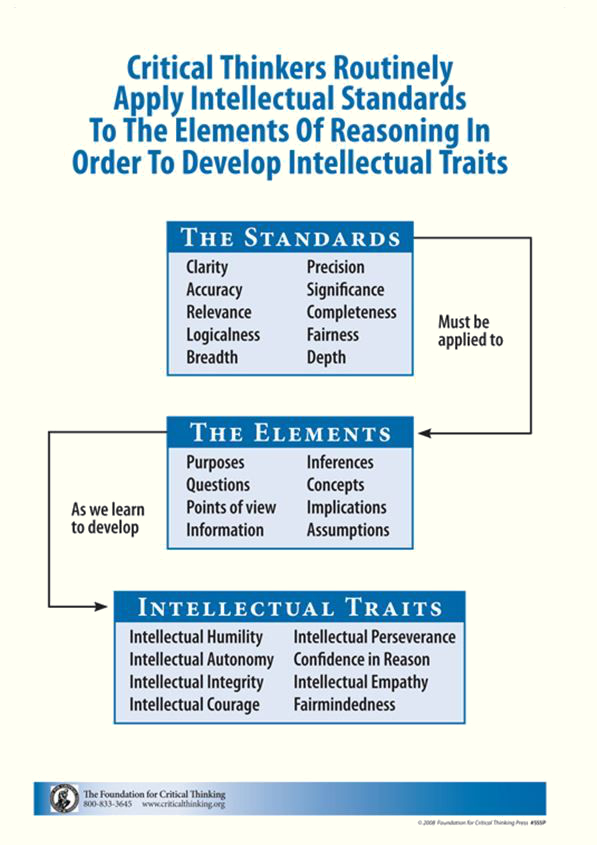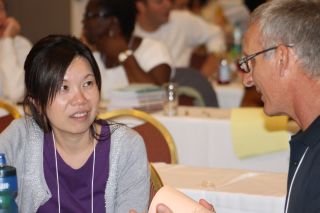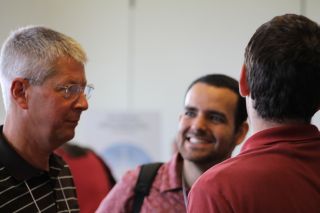Day One, Friday: The Foundations of Critical Thinking Choose one of these foundational sessions for the first day of the academy:
• Foundations of Critical Thinking: College and University... Dr. Gerald Nosich
• Foundations of Critical Thinking: K-12... Dr. Linda Elder The first day of this academy will focus on the fundamentals of critical thinking. This session will lay the foundation for the other workshop sessions. It will introduce you to some of the most basic understandings in critical thinking – namely, how to analyze thinking, how to assess it, and how to develop and foster intellectual virtues or dispositions.
One conceptual set we will focus on is the 'Elements of Reasoning,' or 'Parts of Thinking.' The Elements or Parts of Reasoning are

those essential dimensions of reasoning that are present whenever and wherever reasoning occurs —independent of whether we are reasoning well or poorly. Working together, these elements shape reasoning and provide a general logic to the use of thought. They are presupposed in every subject, discipline, and domain of human thought.
A second conceptual set we will focus on is that of universal 'Intellectual Standards.' One of the fundamentals of critical thinking is the ability to assess reasoning. To be skilled at assessment requires that we consistently take apart thinking and examine the parts with respect to standards of quality. We do this using criteria based on clarity, accuracy, precision, relevance, depth, breadth, logic, and significance. Critical thinkers recognize that, whenever they are reasoning, they reason to some purpose (Element of Reasoning). Implicit goals are built into their thought processes. But their reasoning is improved when they are clear (Intellectual Standard) about that purpose or goal. Similarly, to reason well, they need to know that - consciously or unconsciously - they are using relevant (Intellectual Standard) information (Element of Reasoning) in their thinking. Furthermore, their reasoning improves if and when they make sure that the information they are using is accurate (Intellectual Standard).
A third conceptual set in critical thinking is that of 'Intellectual Virtues,' 'Traits,' or "Dispositions.' Critical thinking does not entail merely intellectual skills. It is a way of orienting oneself in the world. It is a way of approaching problems that differs significantly from that which is typical in human life. People may have some critical thinking skills and abilities, and yet still be unable to enter viewpoints with which they disagree. They may have some critical thinking abilities, and yet still be unable to analyze the beliefs that guide their behavior. They may have some critical thinking abilities, and yet be unable to distinguish between what they know and what they don’t know, to persevere through difficult problems and issues, to think fairmindedly, to stand alone against the crowd. Thus, in developing as a thinker, and in fostering critical thinking abilities in others, it is important to develop Intellectual Virtues – the virtues of fairmindedness, intellectual humility, intellectual perseverance, intellectual courage, intellectual empathy, intellectual autonomy, intellectual integrity, and confidence in reason.
Days Two and Three,
Saturday and Sunday: Choose one of the following: How to Bring Critical Thinking into Instruction on a Typical Day... Dr. Linda Elder Bringing critical thinking into teaching and learning on a typical day entails understanding the concepts and principles embedded in critical thinking, and then applying those concepts throughout the curriculum so that every day students come to your class, they are engaged in deep learning through content. It means developing powerful strategies that emerge when you begin to internalize and utilize the principles of critical thinking. In this workshop, we will focus on strategies for engaging the intellect wthin your courses on a typical day. These strategies are powerful and useful because each is designed to help students actively engage their minds in thinking through what they are trying to learn. Each strategy represents a shift of responsibility for learning from teacher to student. These strategies suggest ways to help your students learn to do the hard (but necessary) work of learning. One of our purposes will be to better understand the intimate connection between thinking critically within a subject, discipline, or domain of thought, and being able to assess both the reasoning of an author - as well as one’s own reasoning - as one decides to “take in” or “reject” ideas of others. Peer assessment through use of Intellectual Standards will be a focus of the session, as a primary vehicle for assessment of learning, as will the development and use of the language, or lingua franca, of critical thinking in the classroom on a typical day.
Socratic Questioning... Dr. Gerald Nosich Socratic questioning is disciplined questioning that can be used to pursue thought in many directions and for many purposes, including: to explore complex ideas, to get to the truth of things, to open up issues and problems, to uncover assumptions, to analyze concepts, to distinguish what we know from what we don’t know, and to follow out logical implications of thought. The key to distinguishing Socratic questioning from questioning per se is that Socratic questioning is systematic, disciplined, and deep, and usually focuses on foundational concepts, principles, theories, issues, or problems.
The art of Socratic questioning is intimately connected with critical thinking because the art of questioning is important to excellence of thought. What the word “Socratic” adds to the art of questioning is systematicity, depth, and an abiding interest in assessing the truth or plausibility of things. Critical thinkers not only ask questions, they ask deep, significant, unbiased questions.
Both critical thinking and Socratic questioning share a common end. Critical thinking provides the conceptual tools for understanding how the mind functions (in its pursuit of meaning and truth); and Socratic questioning employs those tools in framing questions essential to the pursuit of meaning and truth.
This session will include an introduction to the theory and practice of Socratic Questioning, through emphasis on the analysis and assessment of reasoning. Participants will be engaged in Socratic dialogue, and will gain introductory experience in Socratic questioning that, with practice, can lead to an increasingly richer understanding of the power inherent in disciplined questioning as a tool for teaching and learning.





